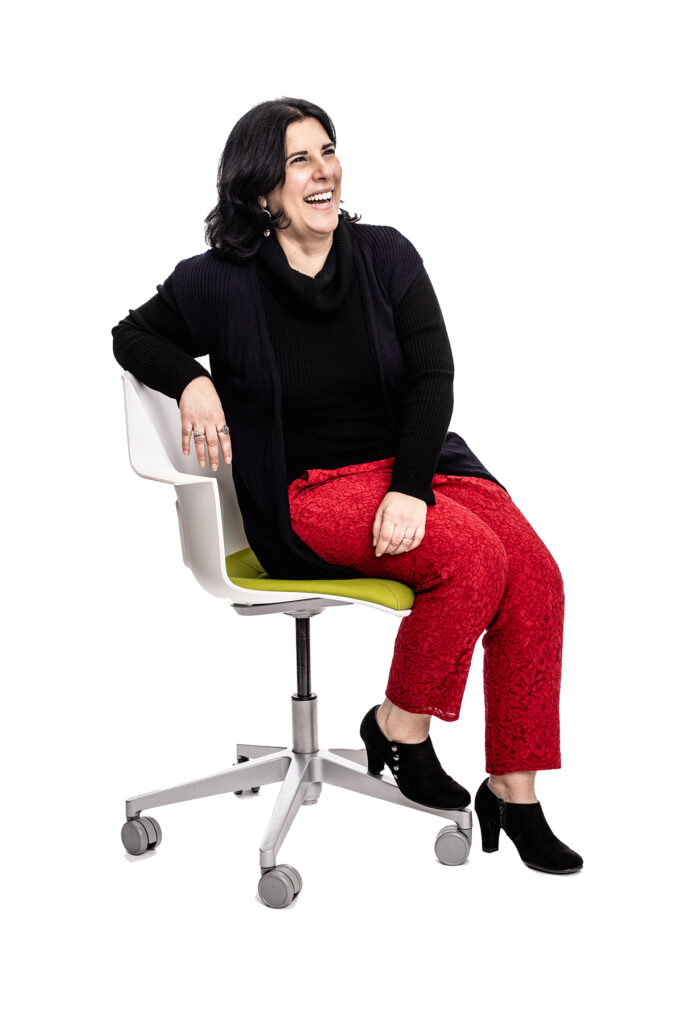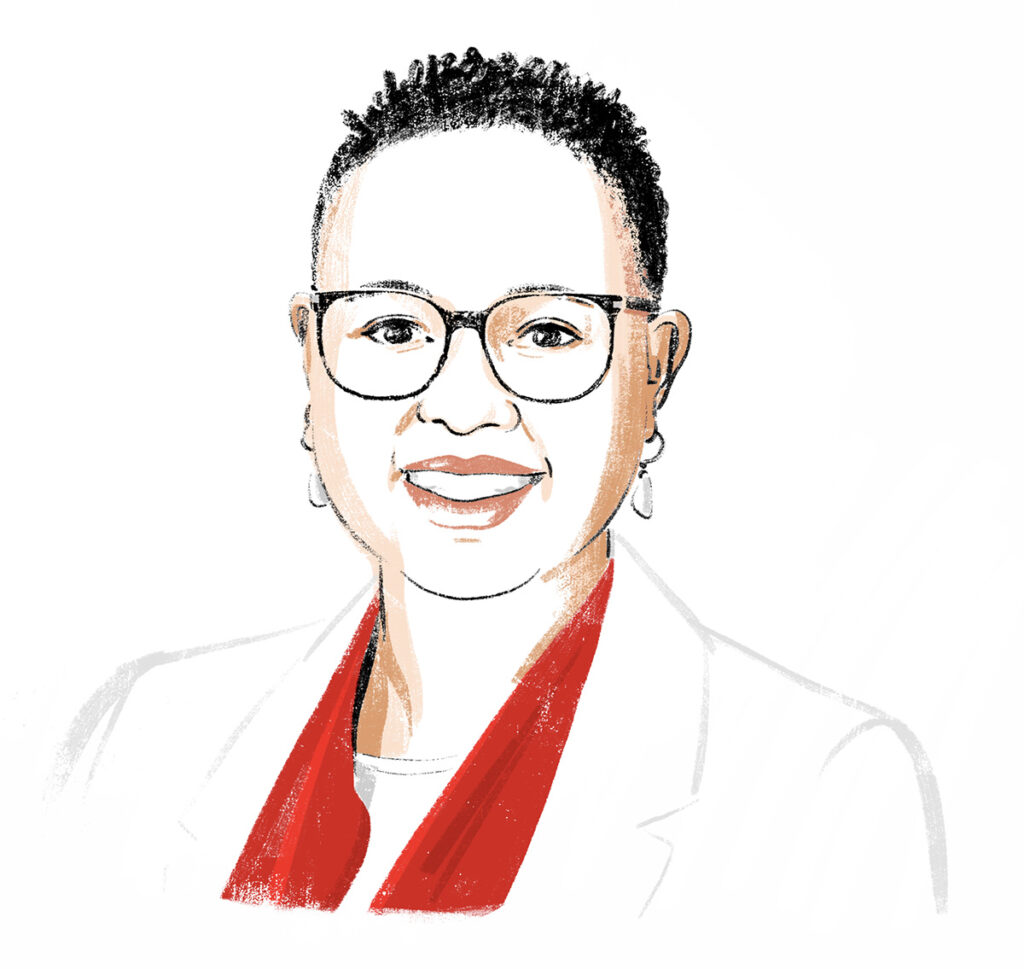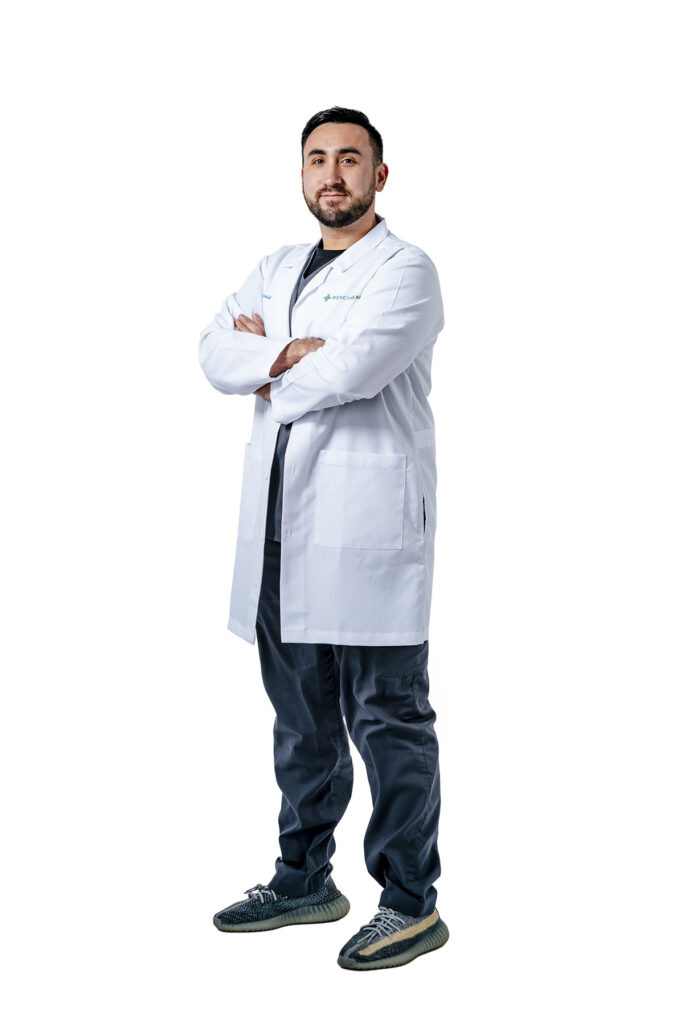Life Is a Marathon
Nicholas Albano, PharmD’16 (Flor), is a member of the first class to graduate from the School of Pharmacy and Health Sciences. From there, he went to the University of Toledo (Ohio) Medical Center, where he is the nighttime pharmacy manager. He balances that role with working in the pharmacy at St. Charles Hospital and with working for Cardinal Health in his “first dive into tele-pharmacy.”
Antoinette Richard, PharmD’19 (Flor), works in an outpatient clinic at U.S. Army post Camp Zama in Japan, about 25 miles southwest of Tokyo. She treats military patients, retirees, civilians employed by the military and their families.

Maria Leibfried (Photo: Bill Cardoni)
Both Albano and Richard did their clinical practicums under Leibfried. “I’m drawn to students who are conscientious. Nicholas and Antoinette both have natural curiosity. They really went above and beyond,” she says. “Both are also natural conversationalists. I don’t know if we just had this chemistry, but it’s a two-way street. We’ve learned from each other; the relationships are very organic and kind of developed naturally.”
“We first communicated by email,” Albano recalls. “I was worried about going to church on Sunday because everybody said, ‘Oh she’s so tough, and there’s so much work to do.’ So I wrote, ‘I’m not going to come to the hospital on Sundays,’ and she replied, ‘Absolutely!’”
“I remember my first day of rotation: I was extremely nervous,” Richard says. “I can say with certainty that I was the oldest in my corps of students. And I had kids, so I was nervous about being able to keep up with everybody else. Maria talked me through a lot, and I think that put me at ease.”
Antoinette Richard: What professional experiences did you have that led to your position at FDU?

Antoinette Richard (Illustration: Arthur Mount)
Maria Liebfried: Working in a community pharmacy made me a better hospital pharmacist, and working in a hospital made me a better nursing-home pharmacist. So, although it wasn’t intentional to have so many different experiences, I really feel that all of my experiences are better because of each other. You’re already starting at a higher level and then incorporating everything that’s part of your foundation. FDU had a brand-new pharmacy school, and they started hiring clinical faculty. My husband, who’s a pharmacist at the James J. Peters Department of Veterans Affairs Medical Center in the Bronx, texted me “You know what? One of our pharmacy residents just got a job at Fairleigh Dickinson University. You have to call someone named Anastasia Rivkin.” And I knew her! We both did poster presentations at the New Jersey Pharmacists Association Convention and we happened to be next to each other. So that was how it happened, and I have to say, it really is perfect, because it is academia and patient care. I waited 45 years to get my dream job, and I finally have it!

Nicholas Albano (Photo: Nick Hagen)
Nicholas Albano: Here’s a fun one: If you could have a gigantic billboard anywhere with anything written on it, what would it say and why?
M.L.: One thing that’s really hard for pharmacists is that we have very high standards and expect perfectionism from ourselves. What’s really important to reflect on is that nobody’s perfect and nobody expects perfectionism from you. People are a lot more forgiving of you than you are of yourself. So for the billboard — “Nobody’s perfect and nobody expects you to be perfect, so don’t expect perfectionism of yourself.”
A.R: I was a stay-at-home mom for the better part of a decade. For me to go from that to making my career a priority was a big step. How do you find work-life balance? How do you set your priorities and your boundaries?
M.L.: When I’m home, I don’t turn my computer on or check emails until 8 a.m. The hardest part is forcing myself to stop around 4:30 p.m., especially when I don’t have something else that I have to do.
Another thing that’s really important is setting reminders, because habits are not perfect. The recalibration and the reminding are important.
Finally, especially because I have students, I’m really open to sharing my work-life balance issues. I might say, “I’m taking the day off tomorrow to take my kids Christmas shopping.” Students should know that it is okay to do. I think just having those conversations is how I’m trying to pay it forward. Hopefully, every generation will get a little bit better at work-life balance.
A.R.: What is a book that you would recommend to someone that was recommended to you?
M.L.: There is a book that I read, probably about 20 years ago, that I say changed my life. It’s by Maria Shriver, and it’s called Ten Things I Wish I’d Known — Before I Went Out Into the Real World. It’s a very short, easy read. It’s based on a college graduation speech that she gave. One of the things she says in there is, “Life is a marathon.” In that chapter, she talks about how when you’re an ambitious person you want to do all of these amazing things in your life. Since life is a marathon, you will be great at so many things, but you can only be great at one thing at one time.
N.A.: What is the best question anyone has ever asked you and, if you remember, how did you answer?
M.L.: A student once asked, “How come you’re always happy?” And I said, “I don’t know, I think it’s because I’m happy.” Don’t underestimate the power of being happy.
One of the people who has had a very big impact in my life was my residency program director Mark Sinnett. He’s the director of clinical and educational pharmacy services at Montefiore Medical Center in the Bronx. And he said, “If you love your job, and you love your home, and you love to sleep, then you’ll love your life.”
N.A.: What is an activity you did a lot when you were a child — or just earlier in life — that you wish you could do more of now?
M.L.: I used to be really good at roller skating. That was my jam. I had roller skates — high tops with hot-pink wheels. I’m actually good at ice skating, too. I really went through a Dorothy Hamill phase. Roller rinks are very, very hard to come by now. And ice skating, you’ve got to find the time. I wish it was something I could just go outside and do!
A.R: How has failure or an apparent failure set you up for success later in life?
M.L.: I really felt physically sickened by failures initially. However, most of the time, it’s fixable.
I joined academia and started learning about teaching, not necessarily teaching pharmacy, but just teaching. Teachers are very open to, “Try it and if it doesn’t work, next year you don’t have to do it.” I’m a lot more spontaneous now and more innovative. I’m willing to try things and to be OK with things that didn’t work.
Sharing those things with my students is also part of my mission of helping them realize that they don’t have to be perfect either.
A.R.: In pharmacy, there’s no perfect answer, because every patient is different, and their disease state — as far as the degree of advancement — is different. So I’ve learned to collaborate. I think some days you win and some days you learn.
I just want to thank you, Professor Leibfried for encouraging me and letting me know that it’s OK to make those mistakes and learn from day to day. I think I’ve come a long way in a short amount of time. I’m learning to find my voice.
And I just really appreciate your support and mentorship.
N.A.: What comes to mind, for me, is I was rejected from a local pharmacy school, and all I can think is, “Thank God, because I would not have traded my experience in New Jersey for anything.” It was because of the people. And really high on that list is you, Professor Leibfried.
M.L.: Thank you for those kind words.